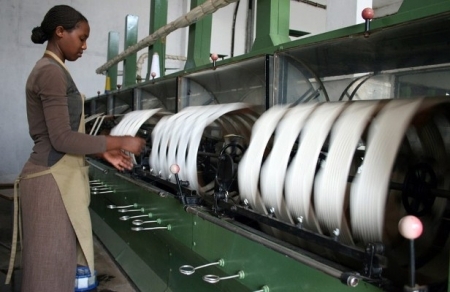Africa needs to accelerate the pace of industrialization to encourage broad-based growth. Africa's growth has been impressive over the past 15 years, picking up from an average of 2% during the 1980s and 1990s to just above 5% between 2001 and 2014.
Growth has, however, dipped to just below 4% since 2014, largely in response to a global decline in commodity prices. This illustrates the continent's continuing dependence on commodity demand, and highlights the need to strengthen its economic base through further industrialization - currently, Africa accounts for less than 2% of global manufacturing, while manufacturing has been stagnant or declining as a percentage of GDP in all but a few countries.
Regional integration must be a core component of industrialization. Among the various pathways to industrialization - strengthening democratic institutions and ensuring transparent and accountable governance, for example - regional integration is one of the most underutilized. While manufactured goods make up only 20% of Africa's total exports, they make up 60% of trade between African countries.
This highlights the opportunity that Africa represents as a buyer of its own manufactured products - especially those that are costly or difficult to import from more far-flung regions. Still, despite some improvements in opening borders, the continent remains highly fragmented - existing intra-regional trade levels are the lowest in the world - and the potential for intra-African trade remains largely untapped. For example, a truck delivering goods to supermarkets across borders in Southern Africa can be expected to carry up to 1600 documents to satisfy various legal requirements.
Further, visa regulations make it harder for Africans themselves to travel within Africa than for North Americans or Europeans, and limit visits and exchanges that encourage trade. Restrictions like these make intra-regional trade in Africa the most expensive in the world - costs are 50% higher than in East Asia, for example - and, in many instances, create a situation where Chinese or European markets are 'closer' to many African countries than their neighbours.
Open borders will open up markets and increase productivity. Free movement will boost our economies and help to transfer skills, knowledge, technology and best practice. While there has been commendable progress such as the launch of the African Passport and the African Openness Report, countries need to harmonise their policies to address the concerns hindering open borders across the continent ̶ such as security and immigration management practices. It is advisable that open border policies are firmed up at the Regional Economic Communities and then scaled up through grand regional Agreements. However, political goodwill and coordination are critical elements for successful integration.
Infrastructure investment is a critical enabler of integration. Free movement of goods and people will only become a reality when African countries build links across the continent ̶ roads, railways, airports and ports that will allow people, goods, services and capital to move seamlessly around the continent. Reducing tariffs and easing legal restrictions on movement is crucial, but insufficient.
To boost integration and trade, dramatic improvements in Africa's connective infrastructure is needed. This includes not only investments in transport networks, but also those that create shared infrastructure to facilitate trade and exchange, such as investments in information and communications technology and regional markets for services - energy pools that allow power plants to distribute energy across multiple countries, for example.
The African Development Bank estimates that there is an annual financing gap of $50 billion to meet Sub-Saharan Africa's infrastructure needs. Closing it will require drawing in greater private sector investment. One way to do this is make more strategic use of development finance and support. Investors often bemoan the lack of investable or 'bankable' infrastructure projects on the continent.
While there are several facilities available to assist investors with the costs of identifying and preparing projects, awareness of these is low and facility design is often ill fitted to investor needs.
There is a need to better match facilities with investors through initiatives like the Infrastructure Consortium for Africa's (ICA) and Project Preparation Facilities Network (PPFN), which aim to increase reach, collaboration and learning among support providers on the continent. New financial instruments can also help alleviate risk aversion in private investors. For example, the Asian Development Bank (ADB), in partnership with the India Infrastructure Finance Company Ltd. (IIFCL), has created a $128 million "project bond guarantee facility" that raises the credit rating of infrastructure bonds by absorbing a portion of risk.
The Programme for Infrastructure Development in Africa (PIDA) is an important continental initiative and policy framework designed to reduce the dire soft and hard infrastructure deficit in Africa ̶ through transport, energy, ICT and transboundary water networks. In order to realise PIDA's objectives ̶ realigning Africa's connectivity with global demands for accessibility and competitiveness ̶ within the set timelines (up to 2030), African governments, the coordinating Agencies (the African Union Commission, African Development Bank, United Nations Economic Commission for Africa and NEPAD) and all African stakeholders have to work jointly and within the requisite enabling environment. Political and economic goodwill, ownership, partnerships and investment, collaboration, coordination and cooperation will enable efficient and effective implementation.
The call for industrialization is not new for Africa, but we must now heed it in a different way. Global markets will play their part, but we must not forget the opportunities that lie on our own doorstep.
Africa must take responsibility for the growth of its own economy and institutions. We have the means, partnerships and the capacity to do so.
Amb. (Dr) Amina Mohamed is Kenya's Minister for Foreign Affairs and a Candidate for African Union Commission Chairperson)

